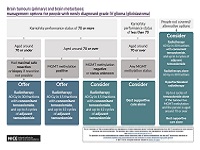Overview
This guideline covers diagnosing, monitoring and managing any type of primary brain tumour or brain metastases in people aged 16 or over. It aims to improve diagnosis and care, including standardising the care people have, how information and support are provided, and palliative care.
Last reviewed: 29 January 2021
We replaced our recommendation on surgical cavity radiosurgery and radiotherapy with a link to the NHS England commissioning policy on stereotactic radiosurgery and stereotactic radiotherapy to the surgical cavity following resection of cerebral metastases.
Next review: This guideline will be reviewed if there is new evidence that is likely to change the recommendations.
Recommendations
This guideline includes recommendations on:
- investigation of suspected glioma, meningioma and brain metastases
- management of suspected glioma, meningioma and brain metastases
- follow-up and supportive care
- neurorehabilitation
- surveillance for late-onset side effects of treatment

See a visual summary of the recommendations on management options for newly diagnosed grade IV glioma (glioblastoma).
Who is it for?
- Healthcare professionals involved in the multidisciplinary care of people with primary brain tumours or brain metastases
- Commissioners and providers of brain tumour services
- People using services for the diagnosis, management and care of a primary brain tumour or brain metastases, and their families and carers
Guideline development process
How we develop NICE guidelines
This guideline was previously called brain tumours (primary) and brain metastases in adults.
Your responsibility
The recommendations in this guideline represent the view of NICE, arrived at after careful consideration of the evidence available. When exercising their judgement, professionals and practitioners are expected to take this guideline fully into account, alongside the individual needs, preferences and values of their patients or the people using their service. It is not mandatory to apply the recommendations, and the guideline does not override the responsibility to make decisions appropriate to the circumstances of the individual, in consultation with them and their families and carers or guardian.
All problems (adverse events) related to a medicine or medical device used for treatment or in a procedure should be reported to the Medicines and Healthcare products Regulatory Agency using the Yellow Card Scheme.
Local commissioners and providers of healthcare have a responsibility to enable the guideline to be applied when individual professionals and people using services wish to use it. They should do so in the context of local and national priorities for funding and developing services, and in light of their duties to have due regard to the need to eliminate unlawful discrimination, to advance equality of opportunity and to reduce health inequalities. Nothing in this guideline should be interpreted in a way that would be inconsistent with complying with those duties.
Commissioners and providers have a responsibility to promote an environmentally sustainable health and care system and should assess and reduce the environmental impact of implementing NICE recommendations wherever possible.